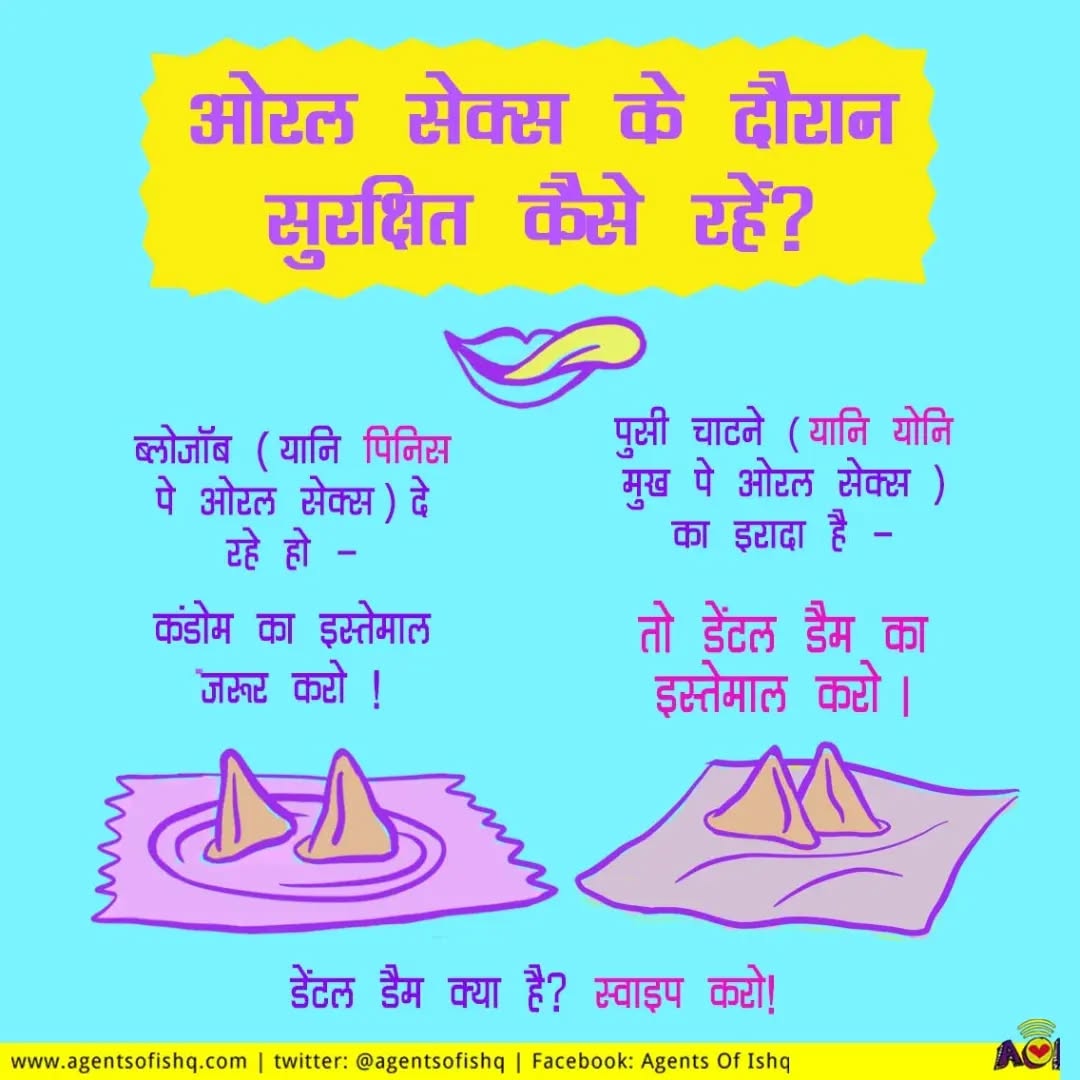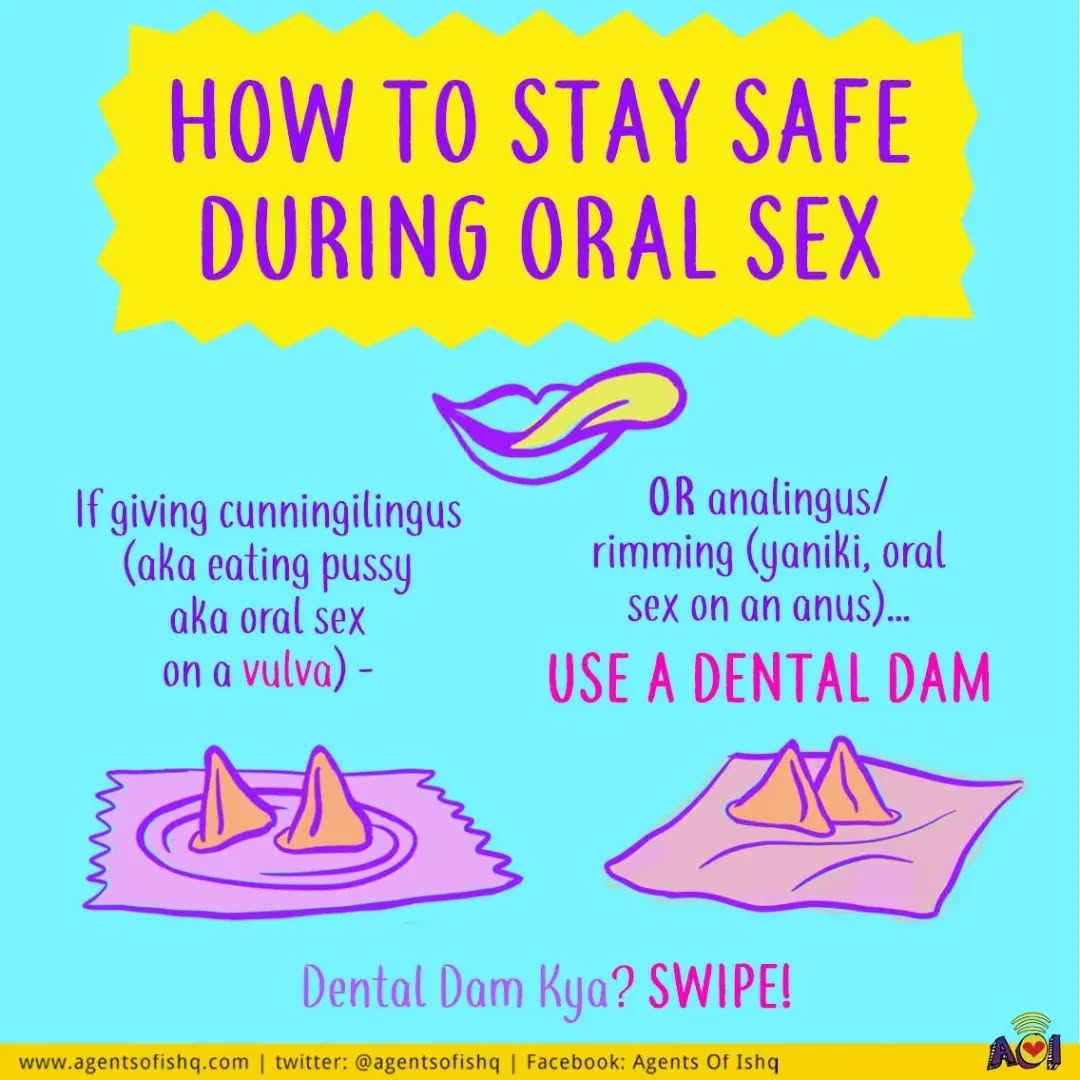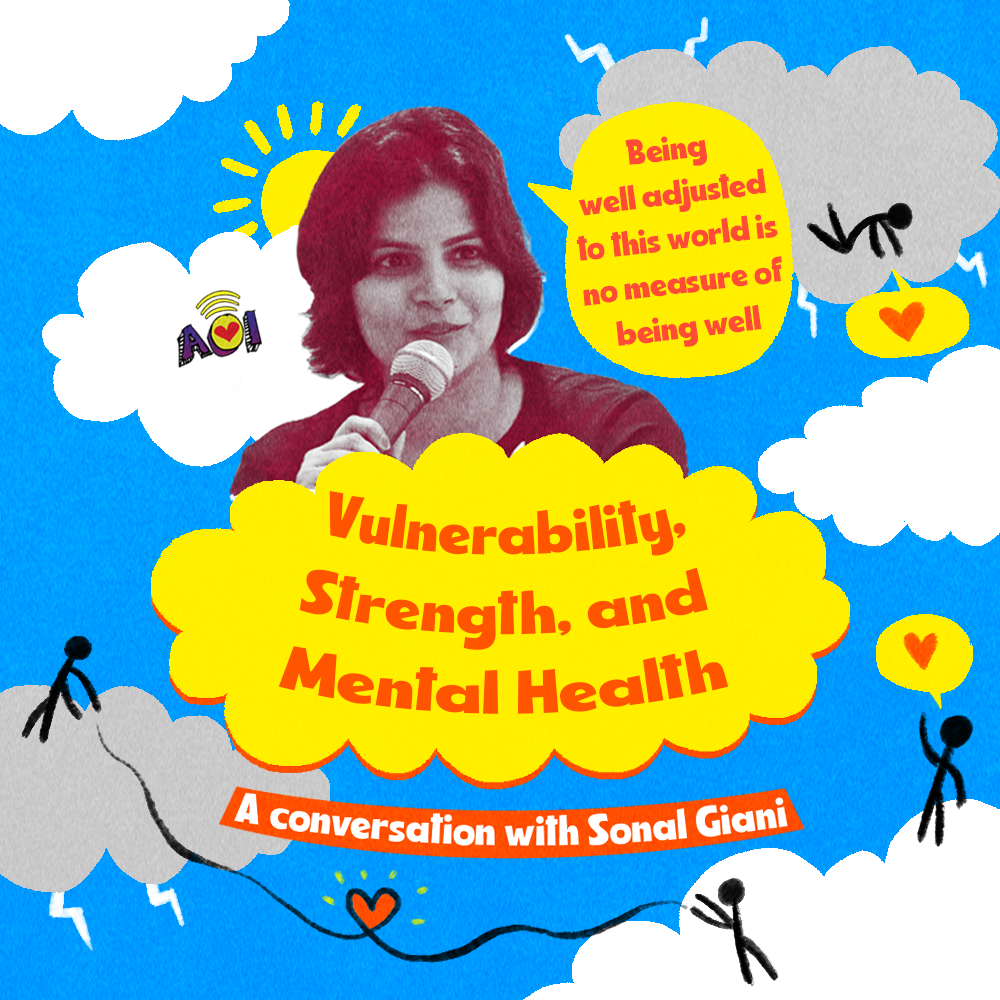 Sonal Giani is a well-known LGBTQ activist - she has worked with numerous organisations and especially a lot of work on queer concerns with families. She's also a filmmaker, and a diversity consultant. She's been part of many television shows and documentaries. Sonal also worked at Agents of Ishq for some time so she's part of our circle of friendship and comradeship. Here Sonal speaks to AOI’s founder Paromita Vohra about the collective responsibility of mental health, her personal journey with therapy, medication and learning the power of being connected to your own feelings.
Sonal Giani is a well-known LGBTQ activist - she has worked with numerous organisations and especially a lot of work on queer concerns with families. She's also a filmmaker, and a diversity consultant. She's been part of many television shows and documentaries. Sonal also worked at Agents of Ishq for some time so she's part of our circle of friendship and comradeship. Here Sonal speaks to AOI’s founder Paromita Vohra about the collective responsibility of mental health, her personal journey with therapy, medication and learning the power of being connected to your own feelings. 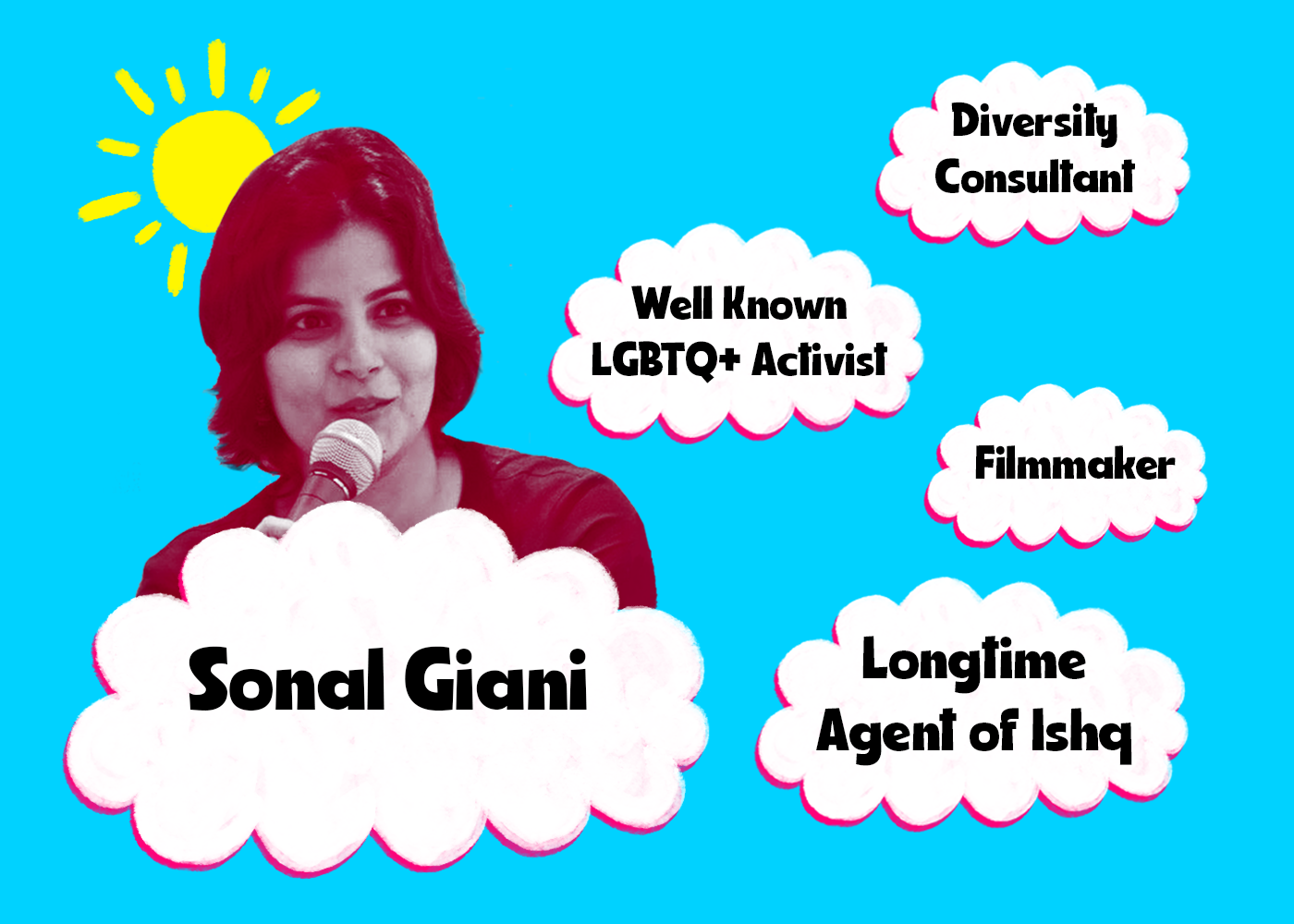 The following interview has been edited and condensed for clarity. PV: When we began Agents of Ishq, we were primarily a site that worked on the idea of sexual health. But we eventually found that it wasn't possible to talk about sex without also talking about mental health, and in diverse ways. We've also seen in the last few months that the conversation about mental health [after the death of actor Sushant Singh Rajput] has taken a real beating because of misinformation. Sonal, what do you think about the way mental health has been discussed recently? SG: It is very alarming, both the discourse in mainstream media and what celebrities are saying about mental health. It's very far from the reality of people who are facing mental health challenges. Sushant Singh Rajput is a case in point. This narrative that strong people or people who are doing well in life don't have mental health challenges, and that they have somehow been influenced to think they do – is a huge disservice. I’m also on medication. The narrative that people force medication on you, and there’s no need to take medication for mental health, that’s very disturbing. PV: In the last few years, and especially after Deepika Padukone spoke about depression, mainstream conversation has grown about mental health. When I was growing up, there was no such conversation. I felt lucky because I discovered that there was a thing called therapy through a friend who went to therapy. When you were younger were people talking about getting help for mental health situations? SG: No, largely, the idea was that if you were some kind of ‘mad’, then you needed to go to a therapist. Nobody around me was in counselling or therapy. I sometimes feel I landed in therapy a few years too late. I had huge misconceptions about therapy -- agar dimaagi problem hai toh hi aap jaaoge in jagaho pe. I showed signs of depression for a good three years before going to therapy, but I chose not to address them. I thought it was a question of strength and weakness. Like I needed to build my capacity to handle it. I ended up in therapy because of external factors. Career, relationships -- all of that was taking a hit. I had no choice but to address it. I didn’t have the right tools to handle my mental health. I left my job because I was not able to perform at work. I [eventually] went because of a friend who was in therapy, and they didn’t have severe depression or complications. The way they presented it to me was, “I have been going for therapy. It has really helped me.” They were also lesbian and going to therapy for sexuality related issues. They were doing really well. My first two therapists were not great but they were the only ones I knew. Therapy really helped me though. And when I found the therapist who was the right fit, my life changed dramatically. This is the other thing people won’t tell you, right! You need to find a good fit.
The following interview has been edited and condensed for clarity. PV: When we began Agents of Ishq, we were primarily a site that worked on the idea of sexual health. But we eventually found that it wasn't possible to talk about sex without also talking about mental health, and in diverse ways. We've also seen in the last few months that the conversation about mental health [after the death of actor Sushant Singh Rajput] has taken a real beating because of misinformation. Sonal, what do you think about the way mental health has been discussed recently? SG: It is very alarming, both the discourse in mainstream media and what celebrities are saying about mental health. It's very far from the reality of people who are facing mental health challenges. Sushant Singh Rajput is a case in point. This narrative that strong people or people who are doing well in life don't have mental health challenges, and that they have somehow been influenced to think they do – is a huge disservice. I’m also on medication. The narrative that people force medication on you, and there’s no need to take medication for mental health, that’s very disturbing. PV: In the last few years, and especially after Deepika Padukone spoke about depression, mainstream conversation has grown about mental health. When I was growing up, there was no such conversation. I felt lucky because I discovered that there was a thing called therapy through a friend who went to therapy. When you were younger were people talking about getting help for mental health situations? SG: No, largely, the idea was that if you were some kind of ‘mad’, then you needed to go to a therapist. Nobody around me was in counselling or therapy. I sometimes feel I landed in therapy a few years too late. I had huge misconceptions about therapy -- agar dimaagi problem hai toh hi aap jaaoge in jagaho pe. I showed signs of depression for a good three years before going to therapy, but I chose not to address them. I thought it was a question of strength and weakness. Like I needed to build my capacity to handle it. I ended up in therapy because of external factors. Career, relationships -- all of that was taking a hit. I had no choice but to address it. I didn’t have the right tools to handle my mental health. I left my job because I was not able to perform at work. I [eventually] went because of a friend who was in therapy, and they didn’t have severe depression or complications. The way they presented it to me was, “I have been going for therapy. It has really helped me.” They were also lesbian and going to therapy for sexuality related issues. They were doing really well. My first two therapists were not great but they were the only ones I knew. Therapy really helped me though. And when I found the therapist who was the right fit, my life changed dramatically. This is the other thing people won’t tell you, right! You need to find a good fit. 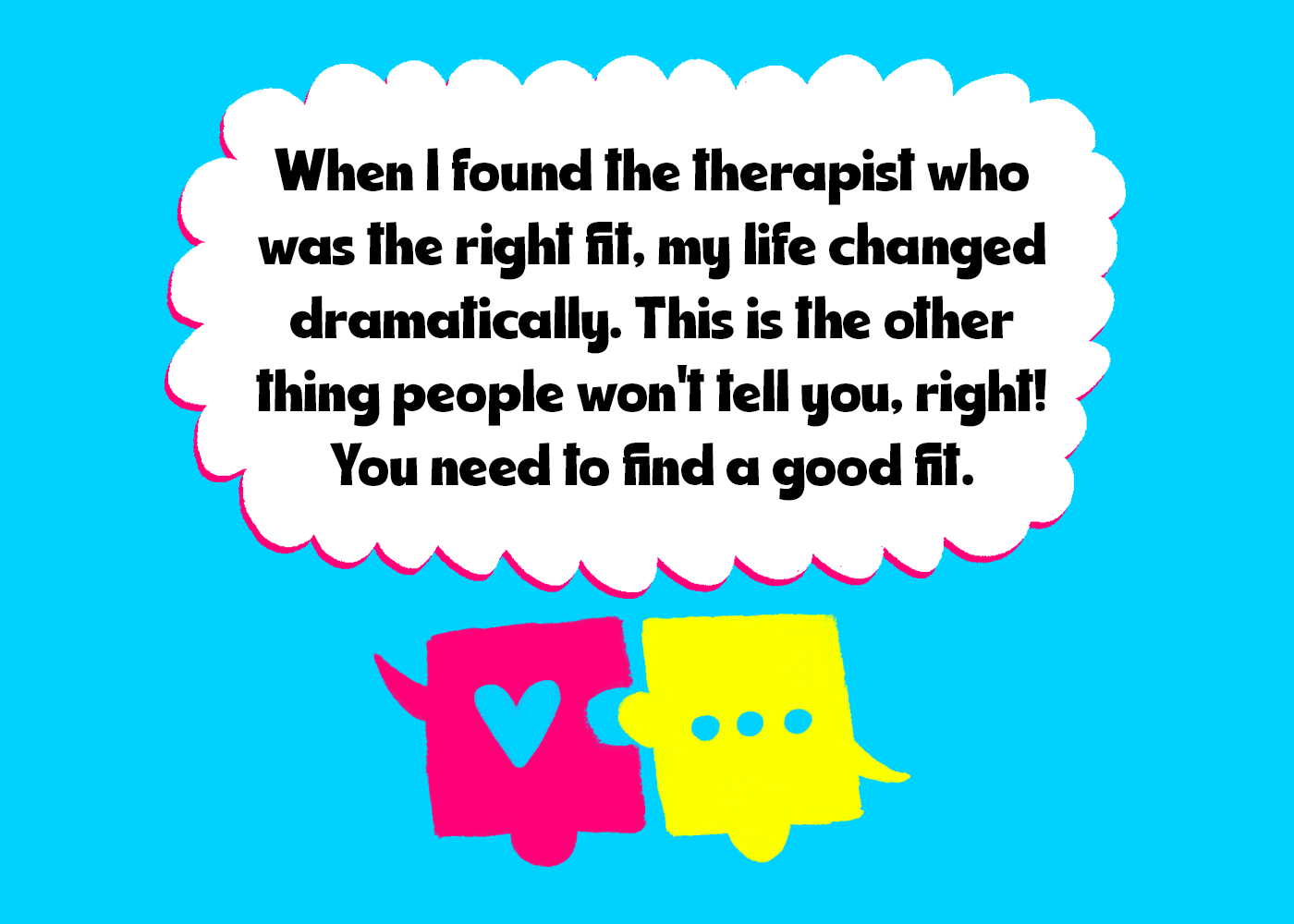 PV: When you’re speaking one can hear that everyone is carrying layers of stigma and shrouding when dealing with mental health issues. Everyone across the board seems to have bought into this division of weakness and strength. No one wants to be seen as a kind of loser. Being atypical - someone not typical of your gender or being queer becomes another layer. And last of all, you talked about the idea that there are mental health situations which seem to almost result from all of these shroudings in a way. So, given all this how did you arrive at the stage when you could say ‘this therapist is a bad fit’? SG: You ease into it. It’s important not to judge the therapist in the first session but usually you can sense things within the first three or four sessions. You start noticing that they have helped you unpack a few things -- that is to take apart an idea or emotional pattern and examine each bit in detail -- successfully. And there will be a shift through your awareness of what has been unpacked. You see the change reflected in your life. It’s very slow and gradual, you have to give it a few months. And over time, you find you are able to develop a relationship of trust with the counsellor. Those are some ways to assess that it is going well for you. Sometimes, we end up holding back because of judgement from our counsellor, or not trusting them. A good counsellor will figure out if you are putting up walls – consciously or unconsciously. And they will be able to, in a few sessions, find out what the walls are. If they are able to break down the walls, find some way of building trust, that helps. However, you may find yourself feeling on an unequal footing with your counsellor. This happened to me initially, where one of my therapists was homophobic. Another was not very supportive of polyamorous relationships. I tried to address it but I sensed resistance. After a few sessions, if you find yourself in a place where you cannot address this kind of issue, then maybe it’s time to move on. And you should tell your therapist if you intend to move on or if something is not working. Initially, when I was in therapy for a year, I felt it was not working. I was only going into therapy because I didn’t know anything else that could help. Then my therapist told me, “Therapy has to work like a bridge. You walk from one end and I walk from the other end, and when we finally meet there we will see things changing.” And that’s precisely what happened. I was eventually able to trust her technique and it worked wonders.
PV: When you’re speaking one can hear that everyone is carrying layers of stigma and shrouding when dealing with mental health issues. Everyone across the board seems to have bought into this division of weakness and strength. No one wants to be seen as a kind of loser. Being atypical - someone not typical of your gender or being queer becomes another layer. And last of all, you talked about the idea that there are mental health situations which seem to almost result from all of these shroudings in a way. So, given all this how did you arrive at the stage when you could say ‘this therapist is a bad fit’? SG: You ease into it. It’s important not to judge the therapist in the first session but usually you can sense things within the first three or four sessions. You start noticing that they have helped you unpack a few things -- that is to take apart an idea or emotional pattern and examine each bit in detail -- successfully. And there will be a shift through your awareness of what has been unpacked. You see the change reflected in your life. It’s very slow and gradual, you have to give it a few months. And over time, you find you are able to develop a relationship of trust with the counsellor. Those are some ways to assess that it is going well for you. Sometimes, we end up holding back because of judgement from our counsellor, or not trusting them. A good counsellor will figure out if you are putting up walls – consciously or unconsciously. And they will be able to, in a few sessions, find out what the walls are. If they are able to break down the walls, find some way of building trust, that helps. However, you may find yourself feeling on an unequal footing with your counsellor. This happened to me initially, where one of my therapists was homophobic. Another was not very supportive of polyamorous relationships. I tried to address it but I sensed resistance. After a few sessions, if you find yourself in a place where you cannot address this kind of issue, then maybe it’s time to move on. And you should tell your therapist if you intend to move on or if something is not working. Initially, when I was in therapy for a year, I felt it was not working. I was only going into therapy because I didn’t know anything else that could help. Then my therapist told me, “Therapy has to work like a bridge. You walk from one end and I walk from the other end, and when we finally meet there we will see things changing.” And that’s precisely what happened. I was eventually able to trust her technique and it worked wonders. 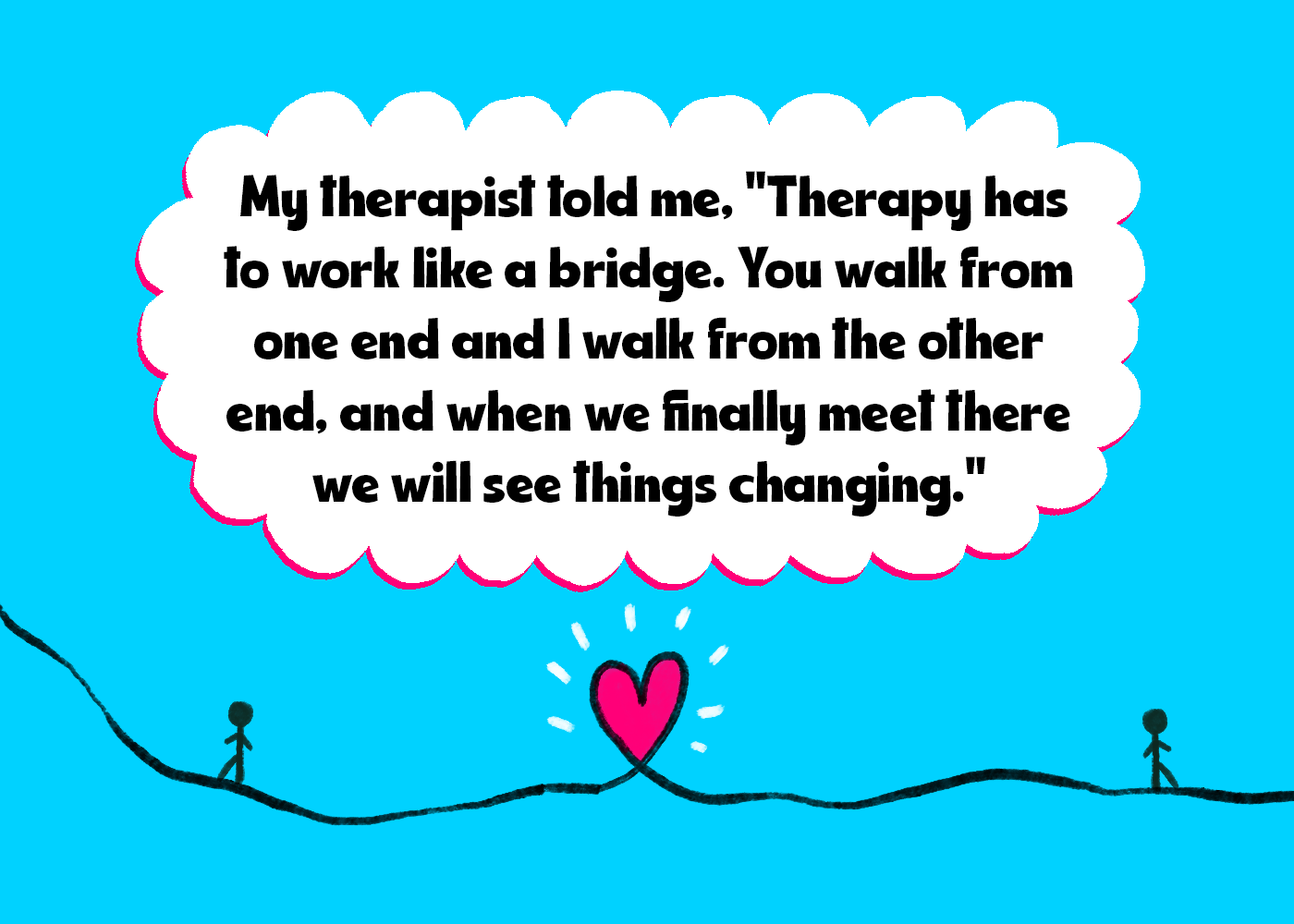 I’d been going to her for about 5 years. From when I was not able to get out of my house. I’d lost all faith that I’d ever be able to work anywhere. My self-esteem was zero, and I had been in the closet about my sexuality. Walking the bridge with this therapist changed me completely. I started working full-time. Even came out to my extended family, to society. It hadn’t been a possibility even in my wildest dreams before. But later, this therapist had some issues unpacking polyamory, and when we came to that, I could see that it was time to move. Today, if I’m in a relationship, and the person says “Oh, I’m in therapy”, I’m like, “Great!” This is going to be a good relationship. PV: Therapy is a complex process, I guess, and a poetic relationship with ourselves where we learn to think about ourselves as a story and not as an object – or that one must perform or be one thing alone. So that helps us to also see other people and work through our pain and anger and our failures. Sonal, for you it has been a winding journey, right? SG: First. I went into therapy after four or five years of being severely depressed and I’m sure there must have been signs in my childhood also. Unpacking things take time. The more you unpack things, the more they play out. I used to think that depression was a permanent place. Then I moved to a feeling of, “Oh, it’s a place that you get out of.” Now I know I have chronic depression, which means that there will be times when it will come back. Sometimes it needs serious medication, more therapy and more counselling. Second, my life brings some unique stressors. Because of my gender and sexuality -- its non-conforming -- I face certain anxieties. In recent years I have started coming out as polyamorous. Owning up to something non-conforming is always challenging. But I decided it’s better to figure ways of dealing with it than not being myself. So that is a choice I'm making. Anyone who is non-conforming is going to have unique stressors. These stressors may have some root in trauma too. Earlier, when I went through homophobic experiences, I believed that I deserved what I was getting because I am queer, and because I am the one who wants to live the non-conforming life. When my first workplace didn’t work out, I believed that my sexuality contributed to it. So in the next workplaces I never talked about my personal life and my sexuality. Earlier I kind of made it out to be, “Oh I have to be stoic I have to be strong.” You deal with it on your own. And now I am like ‘no, allow yourself to be feeling weak, allow yourself to cry’ so yeah that’s what happened. I don't know if you've experienced this but I feel that when I was younger, a lot of time just flew by without me having any time to analyse what happened. But when you grow older, you tend to be more thoughtful and think about things much more and that that will add stressors. With time you realise, “these are my stressors”. For me, this specially keeps coming up, ki aise kaise itne saalo baad apko koi cheez affect kar rahi hai. Abhi toh aap bilkul theek lag rahe ho, Sushant bhi bilkul thik tha, aap bhi bikul thik ho. But trauma has a way of getting inside your skin sometimes. Just a little poking and it comes up. That’s my challenge, there is a lot of trauma which I didn't address. I used to be like, “Oh this is my fault so let’s just move on.” I parked it in one place and said my life has to move on. Now suddenly life is in a better place and I can’t park it anymore. I have to address it because I’m in a better place but also a difficult place because it’s many years of unaddressed feelings. P: When we speak about resilience, sometimes I worry that we go to the other extreme. From saying that, “Oh we always have to be strong” to celebrating weakness per se. When actually what we are saying is that it is alright to feel weak or vulnerable as a way to get to resilience. In the journey to resilience, we don't want to forever be weak, to be out of touch with our own selves and unable to take care of ourselves. We want to come to a place where we are emotionally supple, no? So that we know when we can retreat and when we can be out in the world to take care of ourselves. SG: Also, to find your own unique balance. PV: Yes. Now, you use the phrase ‘suicidal ideation’ as opposed to what many people call, ‘suicidal feelings’. Why do you make this distinction? SG: Feelings are generally something that you’re aware of. Feeling can cause a kind of tension in your body. Feelings are great indicators of what is to come, but in my personal experience of suicidal ideation, I didn’t always [know what is coming]. A few years back when I wanted to self-harm, I experienced a certain kind of dissociation. It was not sadness or lowness. Whatever feelings I had about self-harm, felt like me but when self-harm was happening, it was as if it was to a completely different person. And in my mind, I thought that I’m only thinking these things, I’m not really going to do them. But I was definitely going to do them. So this kind of dissociation that happens, one may not be aware. You may not have a neatly recognizable feeling. The last few times this happened, life had actually been going great for me. I’ve not been able to identify where those thoughts were coming from. That is why I wanted to make that distinction. Ideation may be different from feelings. When you're able to identify suicidal feelings, which I’ve gotten better at now, you know it’s tending towards sadness, tending towards “I don’t feel like living”. Now I’ve gotten better but there were some points in time where I couldn’t identify it. But when there was ideation, the only thing happening in my mind was, there was a well thought through plan of self-harm. And I always thought, “It’s just a plan. Everybody has these thoughts. People think ‘what will happen if I die, would people care?’ and all of that. Everybody does that and this is just that.” But, actually it was not. And I didn’t feel anything until I was in a room where I was about to do something. Thankfully somebody came and cut through that, whatever headspace I was in. I didn’t even realise, I didn’t even feel anything then. There was a lack of feeling, which is why I said ideation. You are dissociated from your surroundings, from awareness. On the other hand, if there is a feeling you can pull back. Feeling is a good way of connecting you and grounding you back. PV: This is a very important and interesting distinction you’re making, which many of us don’t think about. Which is to say that the idea of having feelings, which are so stigmatized by the world, is a good thing because it’s making you aware of your experiences. Whereas when you shut down the feelings it becomes such a habit that you cease to know what you’re feeling. And you start to imagine things and not realise that that imagination can be harmful to yourself. Another thing that you speak about how important medication has been in your personal journey. But you didn’t always take medication, right? How did you arrive at taking medication and what was your relationship with the idea of medication? SG: I was extremely resistant to medication, because I thought it will change my thoughts, change who I was as a person. How do you measure if something is working or not? Or if it has negative effects? The first counselor I met, who prescribed me anti-anxiety medication. When I first had it, I felt like they were giving me a cheeni ki goli, a placebo. My next therapist was good. They told me they’d like to work with me without medication. But a few years later my suicidal ideation started without me even realising it. And this is when I got in touch with another psychiatrist, who said I needed to take medication. I said that I didn’t want to. They asked how many years I had been in therapy. I said 7 or 8 years. They said that if depression had not gone in so much time, I had to take medication. Now I think the doctor who prescribed it was not good because they prescribed very heavy medication for anxiety and also sleeping pills without knowing my history. They did not ensure that I was also going through therapy alongside the pills. I was administered medication when I was clearly not comfortable with it. One of the reasons I moved to Bangalore from Bombay was that I knew there was a poly support group here and there are therapists over here. But after coming here, I was again in a very bad place. When my ideation really peaked over here, my new counselor who had not pushed any medication at me until then, asked me to meet a psychiatrist. By this time I was many years into therapy, and really trusted my counsellor. I’d reached this place again where I felt desperation, like I didn’t know anything that can help. So I met the psychiatrist. She told me, “oh Sonal, it seems like you have a lot of thoughts. It seems like you are also very exhausted with so many thoughts so I’m gonna give you some medication which is going to reduce the thoughts.” I was like, “What does ‘reduce your thoughts’ mean?” I took the medication and my life changed. It’s like you’re working on a laptop, shifting between 400 open windows. And then somebody changes the settings so there are only 10 windows open. Until then, whatever I had heard about managing your stress was ‘take deep breaths’, ‘learn yoga’, ‘you can control your thoughts’, blah blah. But after having medication I realised I was a person who could never control their thoughts.
I’d been going to her for about 5 years. From when I was not able to get out of my house. I’d lost all faith that I’d ever be able to work anywhere. My self-esteem was zero, and I had been in the closet about my sexuality. Walking the bridge with this therapist changed me completely. I started working full-time. Even came out to my extended family, to society. It hadn’t been a possibility even in my wildest dreams before. But later, this therapist had some issues unpacking polyamory, and when we came to that, I could see that it was time to move. Today, if I’m in a relationship, and the person says “Oh, I’m in therapy”, I’m like, “Great!” This is going to be a good relationship. PV: Therapy is a complex process, I guess, and a poetic relationship with ourselves where we learn to think about ourselves as a story and not as an object – or that one must perform or be one thing alone. So that helps us to also see other people and work through our pain and anger and our failures. Sonal, for you it has been a winding journey, right? SG: First. I went into therapy after four or five years of being severely depressed and I’m sure there must have been signs in my childhood also. Unpacking things take time. The more you unpack things, the more they play out. I used to think that depression was a permanent place. Then I moved to a feeling of, “Oh, it’s a place that you get out of.” Now I know I have chronic depression, which means that there will be times when it will come back. Sometimes it needs serious medication, more therapy and more counselling. Second, my life brings some unique stressors. Because of my gender and sexuality -- its non-conforming -- I face certain anxieties. In recent years I have started coming out as polyamorous. Owning up to something non-conforming is always challenging. But I decided it’s better to figure ways of dealing with it than not being myself. So that is a choice I'm making. Anyone who is non-conforming is going to have unique stressors. These stressors may have some root in trauma too. Earlier, when I went through homophobic experiences, I believed that I deserved what I was getting because I am queer, and because I am the one who wants to live the non-conforming life. When my first workplace didn’t work out, I believed that my sexuality contributed to it. So in the next workplaces I never talked about my personal life and my sexuality. Earlier I kind of made it out to be, “Oh I have to be stoic I have to be strong.” You deal with it on your own. And now I am like ‘no, allow yourself to be feeling weak, allow yourself to cry’ so yeah that’s what happened. I don't know if you've experienced this but I feel that when I was younger, a lot of time just flew by without me having any time to analyse what happened. But when you grow older, you tend to be more thoughtful and think about things much more and that that will add stressors. With time you realise, “these are my stressors”. For me, this specially keeps coming up, ki aise kaise itne saalo baad apko koi cheez affect kar rahi hai. Abhi toh aap bilkul theek lag rahe ho, Sushant bhi bilkul thik tha, aap bhi bikul thik ho. But trauma has a way of getting inside your skin sometimes. Just a little poking and it comes up. That’s my challenge, there is a lot of trauma which I didn't address. I used to be like, “Oh this is my fault so let’s just move on.” I parked it in one place and said my life has to move on. Now suddenly life is in a better place and I can’t park it anymore. I have to address it because I’m in a better place but also a difficult place because it’s many years of unaddressed feelings. P: When we speak about resilience, sometimes I worry that we go to the other extreme. From saying that, “Oh we always have to be strong” to celebrating weakness per se. When actually what we are saying is that it is alright to feel weak or vulnerable as a way to get to resilience. In the journey to resilience, we don't want to forever be weak, to be out of touch with our own selves and unable to take care of ourselves. We want to come to a place where we are emotionally supple, no? So that we know when we can retreat and when we can be out in the world to take care of ourselves. SG: Also, to find your own unique balance. PV: Yes. Now, you use the phrase ‘suicidal ideation’ as opposed to what many people call, ‘suicidal feelings’. Why do you make this distinction? SG: Feelings are generally something that you’re aware of. Feeling can cause a kind of tension in your body. Feelings are great indicators of what is to come, but in my personal experience of suicidal ideation, I didn’t always [know what is coming]. A few years back when I wanted to self-harm, I experienced a certain kind of dissociation. It was not sadness or lowness. Whatever feelings I had about self-harm, felt like me but when self-harm was happening, it was as if it was to a completely different person. And in my mind, I thought that I’m only thinking these things, I’m not really going to do them. But I was definitely going to do them. So this kind of dissociation that happens, one may not be aware. You may not have a neatly recognizable feeling. The last few times this happened, life had actually been going great for me. I’ve not been able to identify where those thoughts were coming from. That is why I wanted to make that distinction. Ideation may be different from feelings. When you're able to identify suicidal feelings, which I’ve gotten better at now, you know it’s tending towards sadness, tending towards “I don’t feel like living”. Now I’ve gotten better but there were some points in time where I couldn’t identify it. But when there was ideation, the only thing happening in my mind was, there was a well thought through plan of self-harm. And I always thought, “It’s just a plan. Everybody has these thoughts. People think ‘what will happen if I die, would people care?’ and all of that. Everybody does that and this is just that.” But, actually it was not. And I didn’t feel anything until I was in a room where I was about to do something. Thankfully somebody came and cut through that, whatever headspace I was in. I didn’t even realise, I didn’t even feel anything then. There was a lack of feeling, which is why I said ideation. You are dissociated from your surroundings, from awareness. On the other hand, if there is a feeling you can pull back. Feeling is a good way of connecting you and grounding you back. PV: This is a very important and interesting distinction you’re making, which many of us don’t think about. Which is to say that the idea of having feelings, which are so stigmatized by the world, is a good thing because it’s making you aware of your experiences. Whereas when you shut down the feelings it becomes such a habit that you cease to know what you’re feeling. And you start to imagine things and not realise that that imagination can be harmful to yourself. Another thing that you speak about how important medication has been in your personal journey. But you didn’t always take medication, right? How did you arrive at taking medication and what was your relationship with the idea of medication? SG: I was extremely resistant to medication, because I thought it will change my thoughts, change who I was as a person. How do you measure if something is working or not? Or if it has negative effects? The first counselor I met, who prescribed me anti-anxiety medication. When I first had it, I felt like they were giving me a cheeni ki goli, a placebo. My next therapist was good. They told me they’d like to work with me without medication. But a few years later my suicidal ideation started without me even realising it. And this is when I got in touch with another psychiatrist, who said I needed to take medication. I said that I didn’t want to. They asked how many years I had been in therapy. I said 7 or 8 years. They said that if depression had not gone in so much time, I had to take medication. Now I think the doctor who prescribed it was not good because they prescribed very heavy medication for anxiety and also sleeping pills without knowing my history. They did not ensure that I was also going through therapy alongside the pills. I was administered medication when I was clearly not comfortable with it. One of the reasons I moved to Bangalore from Bombay was that I knew there was a poly support group here and there are therapists over here. But after coming here, I was again in a very bad place. When my ideation really peaked over here, my new counselor who had not pushed any medication at me until then, asked me to meet a psychiatrist. By this time I was many years into therapy, and really trusted my counsellor. I’d reached this place again where I felt desperation, like I didn’t know anything that can help. So I met the psychiatrist. She told me, “oh Sonal, it seems like you have a lot of thoughts. It seems like you are also very exhausted with so many thoughts so I’m gonna give you some medication which is going to reduce the thoughts.” I was like, “What does ‘reduce your thoughts’ mean?” I took the medication and my life changed. It’s like you’re working on a laptop, shifting between 400 open windows. And then somebody changes the settings so there are only 10 windows open. Until then, whatever I had heard about managing your stress was ‘take deep breaths’, ‘learn yoga’, ‘you can control your thoughts’, blah blah. But after having medication I realised I was a person who could never control their thoughts. 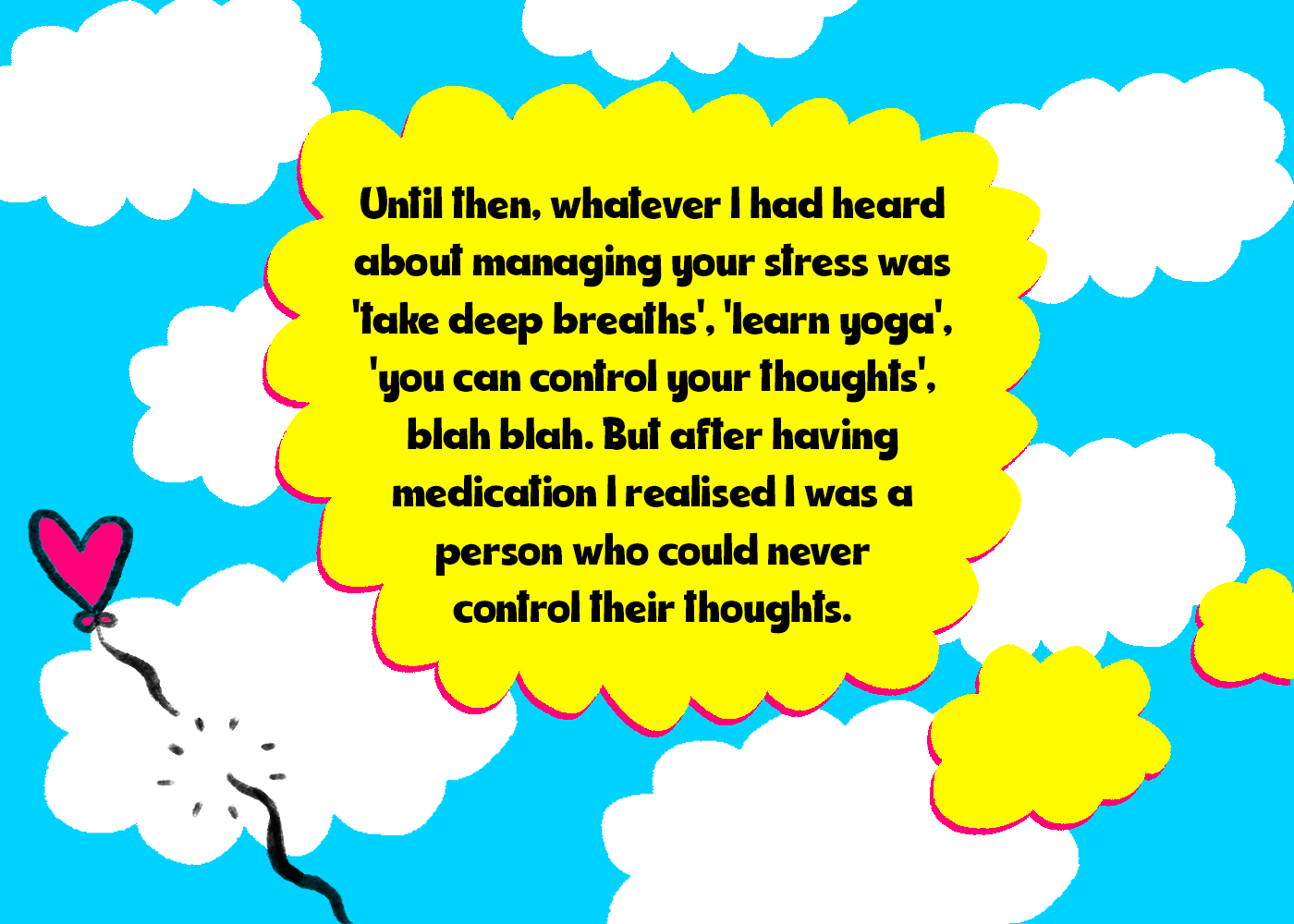 They say you have to slowly get off the medications. But I know people who may have to be on medication their entire lives. I feel if I had agreed to take medication from the right counsellor, ten years of my life would have been different. I feel like I lost out on something simply because I didn't have the ability to just control my thoughts, to breathe, to bring myself back. Some other things also go away when you take medication. For example, I think my articulation suffered a little bit. Earlier, I could access 300 windows from my mind, but now I can access fewer. But in a much more manageable, happier way. It allowed me a change in the quality of life because whenever I had anxious thoughts, it was so much easier to talk to people. My relationship with my partners, my parents, my relationship with myself, changed completely. In India simply because of the number of people with mental health issues, the doctors who prescribe medication might just take 15-20 minutes before pushing medication. Luckily, I had a psychiatrist who took a few hours to really unpack issues with me. I know that sometimes you do not need medication. It should not be pushed down your throat. Sometimes madness is used as a weapon against people. The minute you tag someone with the label ‘mad’ or ‘mentally challenged' you reduce their standing a lot. But medication can work for you. And frankly Paromita, I didn’t know anybody before me, openly saying “I’m undergoing medication”. I remember seeing an Instagram post that said that there’s no shame if you’re on medication. That was all I had seen. PV: As you're rightly saying, whether it’s therapy or counseling or medication, there is no one-size-fits-all treatment. That’s also true of our bodies. Some of us respond better to one kind of treatment, some to another. I think in a weird way Covid is making us confront these things. It’s a disease that doesn’t hit anybody the same way. Different populations respond differently to it, it has so many effects. Our bodies may need different treatments for different things. But isn’t it difficult to navigate your own mental health treatment? ALSO READ ON AOI:
They say you have to slowly get off the medications. But I know people who may have to be on medication their entire lives. I feel if I had agreed to take medication from the right counsellor, ten years of my life would have been different. I feel like I lost out on something simply because I didn't have the ability to just control my thoughts, to breathe, to bring myself back. Some other things also go away when you take medication. For example, I think my articulation suffered a little bit. Earlier, I could access 300 windows from my mind, but now I can access fewer. But in a much more manageable, happier way. It allowed me a change in the quality of life because whenever I had anxious thoughts, it was so much easier to talk to people. My relationship with my partners, my parents, my relationship with myself, changed completely. In India simply because of the number of people with mental health issues, the doctors who prescribe medication might just take 15-20 minutes before pushing medication. Luckily, I had a psychiatrist who took a few hours to really unpack issues with me. I know that sometimes you do not need medication. It should not be pushed down your throat. Sometimes madness is used as a weapon against people. The minute you tag someone with the label ‘mad’ or ‘mentally challenged' you reduce their standing a lot. But medication can work for you. And frankly Paromita, I didn’t know anybody before me, openly saying “I’m undergoing medication”. I remember seeing an Instagram post that said that there’s no shame if you’re on medication. That was all I had seen. PV: As you're rightly saying, whether it’s therapy or counseling or medication, there is no one-size-fits-all treatment. That’s also true of our bodies. Some of us respond better to one kind of treatment, some to another. I think in a weird way Covid is making us confront these things. It’s a disease that doesn’t hit anybody the same way. Different populations respond differently to it, it has so many effects. Our bodies may need different treatments for different things. But isn’t it difficult to navigate your own mental health treatment? ALSO READ ON AOI:
- Mental Health FAQs, just questions you have, doubts you have, answered by a psychologist.
- A list of mental health resources
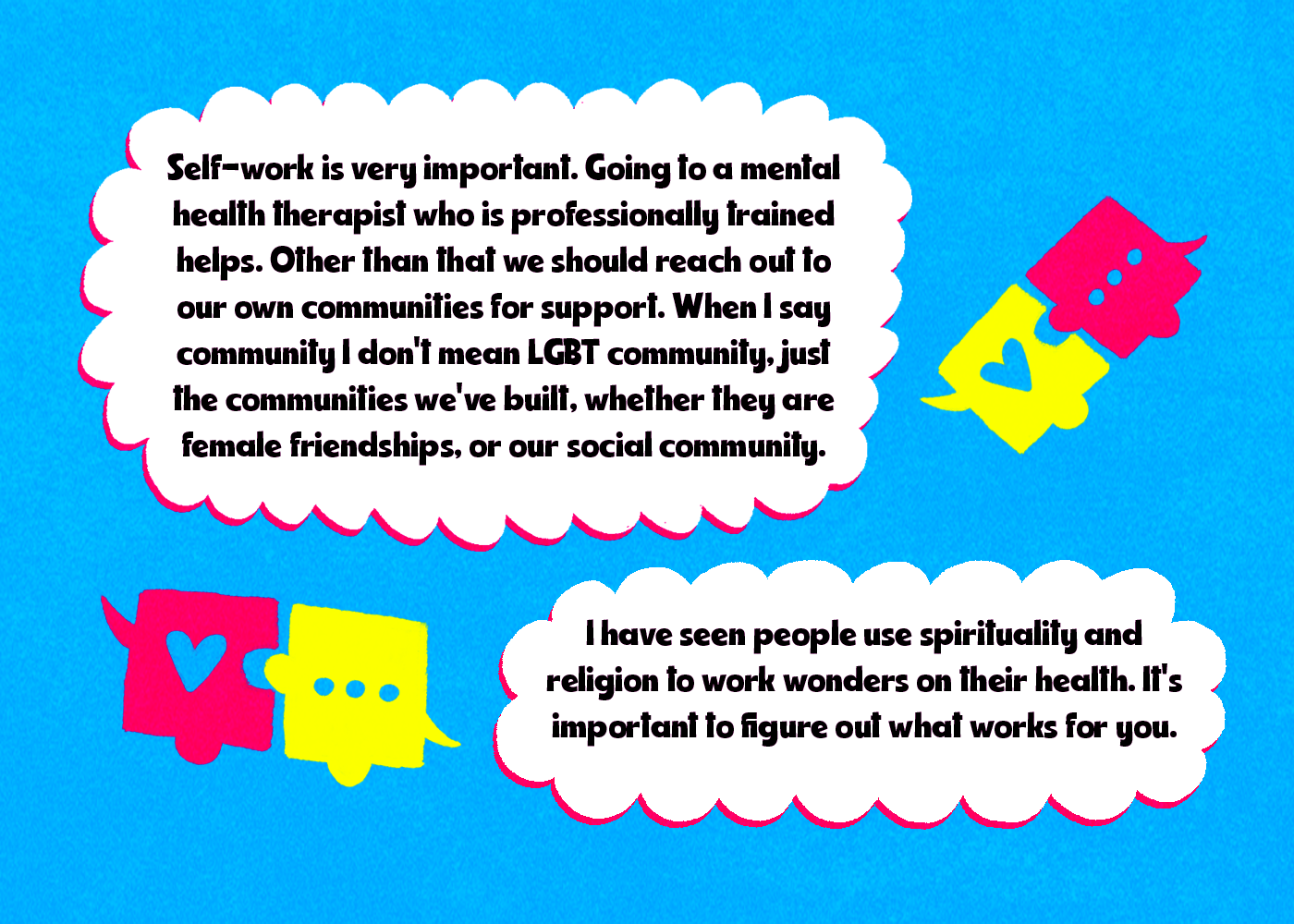 SG: There’s this notion that I am entirely responsible for my mental health and this is a journey I need to do alone with my therapist. Also, this narrative of self-care that asks you to look inward and do it all alone. First, I want to say to people who are going through mental health issues - be easy on yourself. The mental health challenges we’re facing needs to be a collective responsibility. We all have to work with mental health care providers, on workplace policies, social policies to make this world more healthy. Because we are living in a world which is sick. Being well-adjusted in this world is no measure of being well. Our entire environment is going to push some kinds of stressors, and if you belong to some non-conforming community or you are challenging norms, be it politics or anything, there are going to be stressors. Don’t blame yourself entirely. Understand that there is an ecosystem and you’re contributing to this. Self-work is very important. Going to a mental health therapist who is professionally trained helps. Other than that we should reach out to our own communities for support. When I say community I don’t mean LGBT community, just the communities we’ve built, whether they are female friendships, or our social community. I have seen people use spirituality and religion to work wonders on their health. It’s important to figure out what works for you. And another tool that has helped me is music and art. By watching documentaries and biographies of people I’ve come to realize that when I’ve not found friends in life, I’ve found friends in history, who’ve gone through something similar. Before counselling existed, how did you actually talk about issues or do anything? It was through storytelling. PV: Korean drama. Korean drama! I had to say it once. SG: Yeah. Stay open, read more, talk to friends more, have some friends who can be honest to you. The most important thing for me has been to learn to be more vulnerable, very slowly, day by day. Slowly start developing this agency to say, “Okay, I can’t do this,” or “I need help with this.” “Can you support me with this?” Moving slowly has also allowed me to be strong.
SG: There’s this notion that I am entirely responsible for my mental health and this is a journey I need to do alone with my therapist. Also, this narrative of self-care that asks you to look inward and do it all alone. First, I want to say to people who are going through mental health issues - be easy on yourself. The mental health challenges we’re facing needs to be a collective responsibility. We all have to work with mental health care providers, on workplace policies, social policies to make this world more healthy. Because we are living in a world which is sick. Being well-adjusted in this world is no measure of being well. Our entire environment is going to push some kinds of stressors, and if you belong to some non-conforming community or you are challenging norms, be it politics or anything, there are going to be stressors. Don’t blame yourself entirely. Understand that there is an ecosystem and you’re contributing to this. Self-work is very important. Going to a mental health therapist who is professionally trained helps. Other than that we should reach out to our own communities for support. When I say community I don’t mean LGBT community, just the communities we’ve built, whether they are female friendships, or our social community. I have seen people use spirituality and religion to work wonders on their health. It’s important to figure out what works for you. And another tool that has helped me is music and art. By watching documentaries and biographies of people I’ve come to realize that when I’ve not found friends in life, I’ve found friends in history, who’ve gone through something similar. Before counselling existed, how did you actually talk about issues or do anything? It was through storytelling. PV: Korean drama. Korean drama! I had to say it once. SG: Yeah. Stay open, read more, talk to friends more, have some friends who can be honest to you. The most important thing for me has been to learn to be more vulnerable, very slowly, day by day. Slowly start developing this agency to say, “Okay, I can’t do this,” or “I need help with this.” “Can you support me with this?” Moving slowly has also allowed me to be strong. 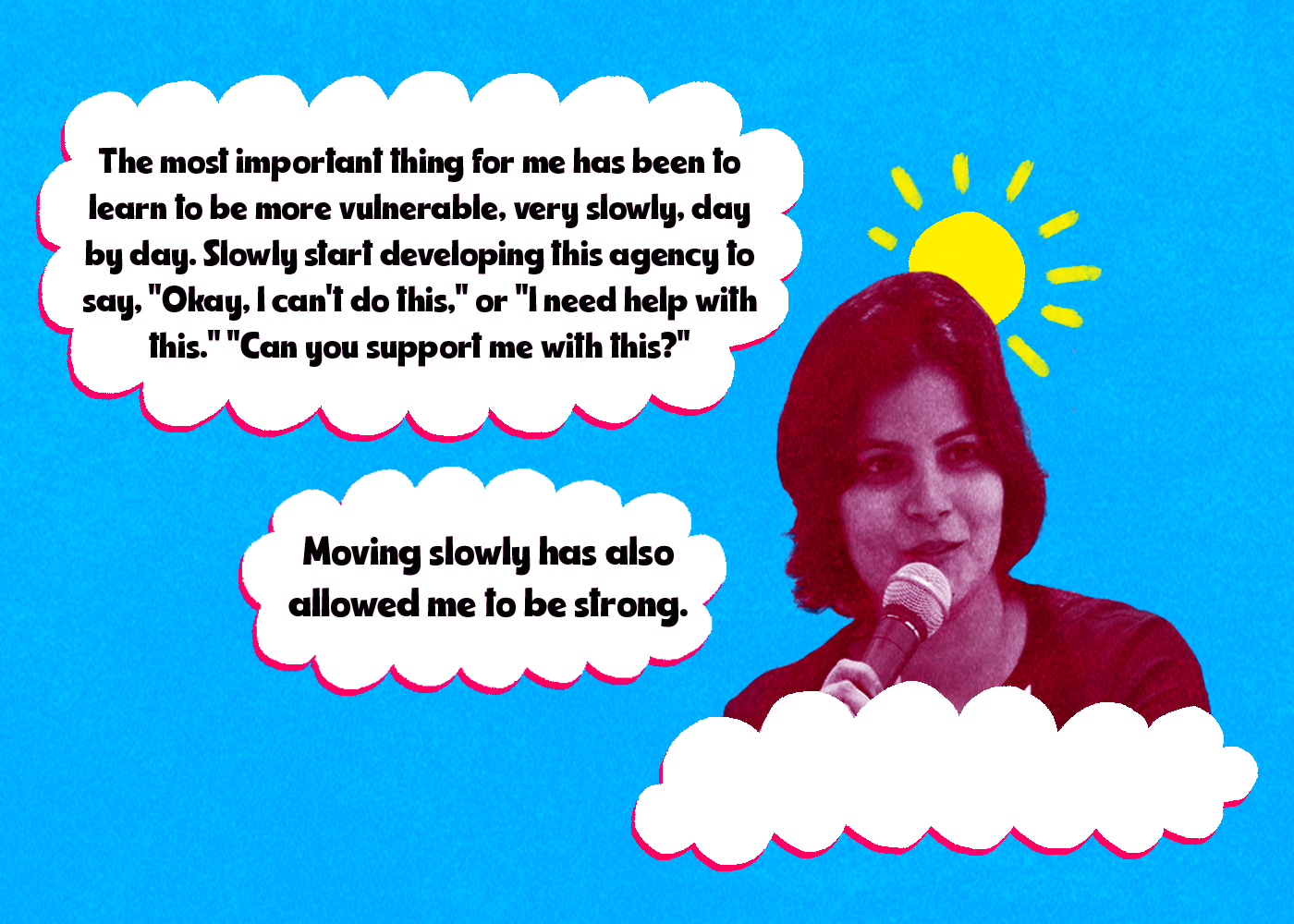 PV: What you’ve said here is part of the important new conversations about mental health. What we call the psychosocial conditions -- that it’s not as if our mental health is disconnected from the world around us. But rather, we live in a world that seems to make hierarchies and make us alone in those hierarchies, of gender, caste, sexuality and success. What I feel you're saying is that art creates value for so many different states of being. Art creates value for our sadness. Art creates catharsis. SG: And sometimes a counselling room may not be as effective as, I don’t know, a song. PV: Yeah, as an honest form of art, that mirrors our emotions. I am also thinking about the things you’ve said about non-conforming genders and sexualities, or castes and classes and professions that are not valued in society, all of which make us severely unhappy and then unwell because of prolonged unhappiness. So, for each of us it’s important to remember that the two things go hand in hand. That we find the communities that value us, not just going by a certain political discourse, but an actual lived politics of communities that value us, whom we can ask for help. It’s great that you’re able to talk about your very difficult experiences in public. I think very few people do it. The way people talk about menstruation normally today, I think we need to get there also with mental health medication and therapy. And saying “I have to go to my therapist right now” or “I’m changing my medication so I don’t feel great, can I have a couple of days off.” These are a few things we have to work together to normalize and to feel better. So thank you! Watch the whole interview at: https://www.instagram.com/tv/CGNAfKbJOAy/?utm_medium=copy_link
PV: What you’ve said here is part of the important new conversations about mental health. What we call the psychosocial conditions -- that it’s not as if our mental health is disconnected from the world around us. But rather, we live in a world that seems to make hierarchies and make us alone in those hierarchies, of gender, caste, sexuality and success. What I feel you're saying is that art creates value for so many different states of being. Art creates value for our sadness. Art creates catharsis. SG: And sometimes a counselling room may not be as effective as, I don’t know, a song. PV: Yeah, as an honest form of art, that mirrors our emotions. I am also thinking about the things you’ve said about non-conforming genders and sexualities, or castes and classes and professions that are not valued in society, all of which make us severely unhappy and then unwell because of prolonged unhappiness. So, for each of us it’s important to remember that the two things go hand in hand. That we find the communities that value us, not just going by a certain political discourse, but an actual lived politics of communities that value us, whom we can ask for help. It’s great that you’re able to talk about your very difficult experiences in public. I think very few people do it. The way people talk about menstruation normally today, I think we need to get there also with mental health medication and therapy. And saying “I have to go to my therapist right now” or “I’m changing my medication so I don’t feel great, can I have a couple of days off.” These are a few things we have to work together to normalize and to feel better. So thank you! Watch the whole interview at: https://www.instagram.com/tv/CGNAfKbJOAy/?utm_medium=copy_link


